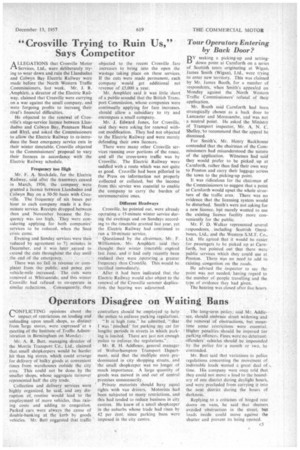"Crosville Trying to Ruin Us," Says Competitor
Page 47

If you've noticed an error in this article please click here to report it so we can fix it.
ALLEGATIONS that Crosville Motor Services, Ltd., were deliberately trying to wear down and ruin the Llandudno and Colwyn Bay Electric Railway were made before the North Western Traffic Commissioners, last week. Mr. J. R. Amphlett, a director of the Electric Railway, claimed that Crosville were carrying on a war against the small company, and were forgoing profits to increas$ their rival's financial difficulties.
He objected to the renewal of Crosville's stage-service licence between Llandudno and Colwyn Bay, Penmaen Head and Rhyl, and asked the Commissioners to allow the Electric Railway to re-introduce the Suez emergency service cuts in their winter timetable. Crosville objected to the Commissioners' proposal to vary their licences in accordance with the Electric Railway schedule.
Frequency too High Mr.' F. A. Stockdale, for the Electric Railway, said after the tramways ceased in March, 1956, the company were granted a licence between Llandudno and Colwyn Bay on a 50-50 basis with Crosvine. The frequency of six buses per hour to each company made it a fiveminute service. Receipts dropped.between then and November because the frequency was too high. They were considering applying for both companies' services to he reduced, when the Suez crisis came.
Evening and Sunday services were then reduced by agreement to 7} minutes in December. and it was later _agreed to extend the cuts throughOut the day until the end of the emergency. • There was no fall in revenue or complaint from the public, and pence per vehicle-mile increased. The cuts were removed at Whitsuntide. and this winter Crosville had refused to co-operate in similar reductions. Consequently, they objected to the recent Crosville fare increases to bring into the open the wastage taking place on these services. If the cuts were made permanent, each company would get additional net revenue of £5.000 a year.
Mr. Amphlett said it was little short of a public scandal that the British Trans_ port Commission, whose companies were continually applying for fare increases. should allow a subsidiary to try and encompass a small company.
Mr. J. Edward Jones, for Crosville, said they were asking for renewal without modification. They had not objected to the Electric Railway and were merely defending their own licences.
There were many other Crosville services running over portions of the route, and all the cross-town traffic was by Crosville.. The Electric Railway were saddled with a route which was not quite as good. Crosville had been pilloried in the Press on •information not properly collected or collated. but the income from this service was essential to enable the company to carry the burden of u n remunerative ones.
Different Headways
Crosville, he pointed out, were already operating a I5-minute winter service during. the evenings and on Sundays according to the timetable granted last year, yet the Electric Railway had continued to run a 10-minute service.
' Questioned by the .chairman, Mr. F. Williamson. Mr. Amphlett said they thought their winter timetable expired last June. and it had only recently been realized they were operating a greater frequency than Crosville. This would be rectified immediately.
• After it had been indicated that the Electric Railway would also object to the renewal of the Crosville summer duplication, the hearing was adjourned.




















































































































